Exploring the Communes of Venezuela * Life in the Liberated Zone * A Concrete Way to Support Venezuelan Communes * Kevin Zeese *
Exploring the Communes of Venezuela
During the first two weeks of August 2023, I had the opportunity to participate in the first Kevin Zeese Solidarity Brigade1, comprised of activists from around the US. We focused on the communes, where thousands of Venezuelans are striving to create a productive, egalitarian, participatory, interconnected democracy.
Two weeks’ immersion in the lives, work, and social organization of the revolution and the communes showed us that the Chavistas, as most participants refer to themselves, consider themselves protagonists of a struggle for a real-life socialist society. They were frank about the difficulties and uncertainties in their process, and about the forces arrayed against them both inside and outside Venezuela, yet it was clear to me that they are genuinely delighted and motivated by the progress they are making together.

Life in the Liberated Zone, one of my blog topics at Activist Explorer.org (coming soon), explores spaces folks create to sustain themselves in the thick of their struggles for justice, equality, and a fair and compassionate society. Spaces where people figure out new ways to organize production, decision-making, caring, and other basic human activities so they can keep their struggles going, in keeping with the principles of these struggles.
Liberated zones are not utopias but spaces of lived experience in real life and real time. Places where participants think together, often fumbling and reevaluating together, to create dignified conditions in which to sustainably pursue their collective struggles and live their daily lives, in the moment and for the future. Examples abound throughout history and across the world, some as broad as whole nations in the throes of popular movements, others as small as a single land parcel takeover or strike encampment.
For the Bolivarian Revolution in Venezuela,2 communes are key liberated zones, at the center of their struggle for socialism. Communards consider themselves protagonists of a longterm project to build a society based in popular power and participatory democracy.

El Panal Socialista 2021 Commune
In Caracas our delegation stayed at the Robinsonian School (Escuela Robinsoniana) run by the multifaceted Frente Francisco de Miranda, a nationwide movement which organizes political, cultural and popular education around the country.
On our first day, after a breakfast featuring, as most meals would, tasty corn arepas and giant avocados, as well as fresh fruit and fruit juices, we rode a bus through Caracas to El Panal 2021 Socialist Commune in the heart of working class neighborhood 23 de enero. We learned how the commune started, faltered, and then gained new life as members dealt with the hardships of the years from 2014 on, confronting the death of their president Hugo Chavez, attacks and sabotage from within, hyperinflation, severe shortages from the US blockade, blackouts, a mass exodus of people, and more attacks. They recounted with pride and humor how they began producing what they needed to keep going, including growing tilapia in an old swimming pool to feed their children.
After introductions, we planned the solidarity work we would be doing, and toured the portion of the commune where we would be working.
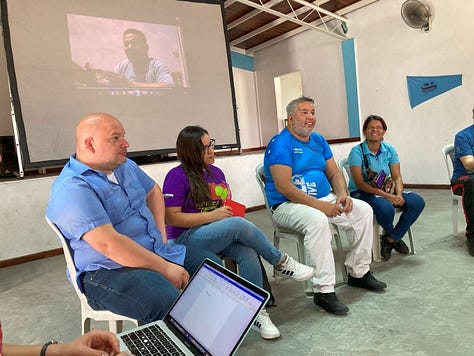

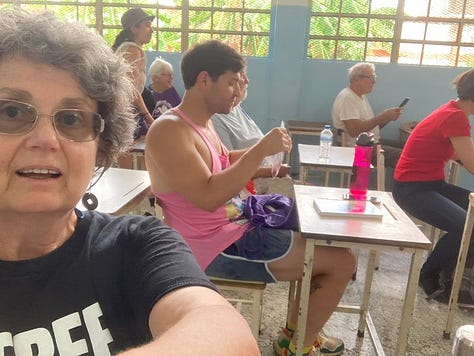
Our solidarity took several concrete forms: first, our presence. People received us with warmth and appreciation, generously differentiating us from the aggressive policies of the US government against their population, (even though our taxes finance them and our passivity enables them).
Second, we brought medicines, seeds, and a few other things (like basketballs and soccer balls), which the US blockade makes scarce and expensive for Venezuelans to obtain. Third, we brought funds to buy needed supplies and equipment for the communes, in particular their flagship projects, including their new communal bank—more about this in subsequent newsletters.
And we brought our own labor: painting a school, cleaning a building for their future commune bank, documenting our experience. These offerings of support, modest but real, in no way make up for the privations the Venezuelan people have suffered because of the US blockade, but they are a tangible offering toward repairing that harm.
El Panal Commune spokesperson Anacaona Marín made it clear as well that while all the solidarity work is important, the work documenting our process is particularly necessary, so both Venezuelans and Americans can learn from it.

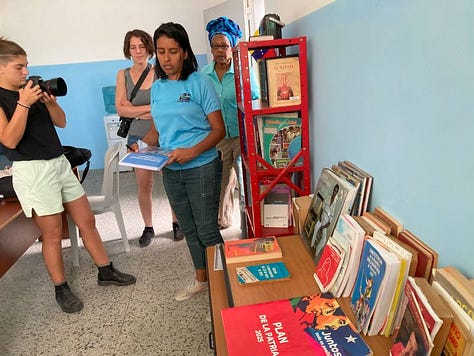

5 Fortalezas Commune
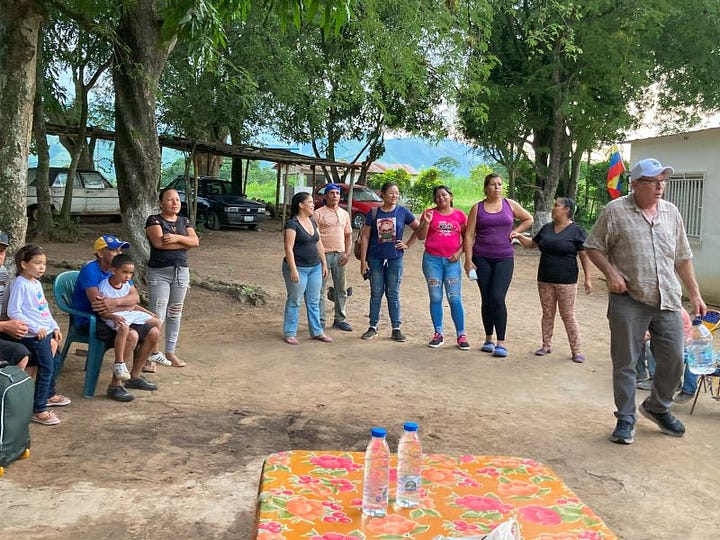
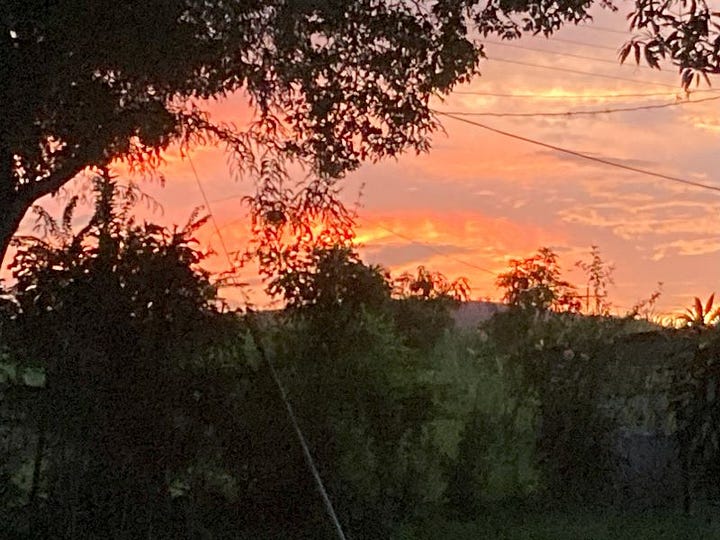

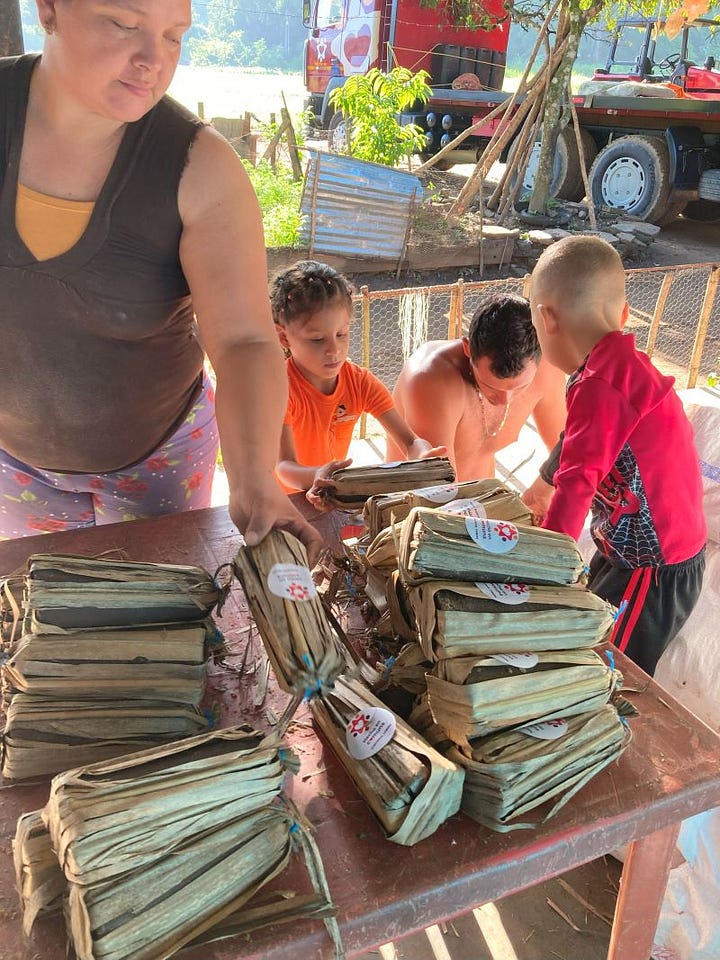
At Cinco Fortalezas cane-sugar producing commune, outside the little town of Cumanacoa, Sucre, Venezuela, we stayed with families, helped them put “Commune Made” stickers on their brown sugar for the first time, tramped across muddy fields to the communal dining area and new sugarcane processing mill (“trapiche”)—and heard heavy rainfall drum harmlessly on the new metal roof protecting their machinery (see and listen to the video below).
I will have more to say about Cinco Fortalezas and the other inspiring communes we visited in future issues.
A Concrete Way to Support Venezuelan Communes
Purchase commune-made items from the Massachusetts-based Anti-Imperialist Action Committee. Products include hand-made notebooks, T-shirts, coffee and more.
Kevin Zeese
Kevin Zeese was a dynamic US activist and lawyer, organizer and enthusiastic participant in many endeavors aimed at social transformation. In 2019, I joined him and many others in the Embassy Protection Collective to protect the Embassy of Venezuela from assault by right-wing Venezuelans trying to install, with full backing of the Trump government and much of the US Congress, the unelected Juan Guaidó as president. They failed, but after we were besieged at the Embassy by these forces, Kevin and three other comrades were arrested and subjected to a year-long legal ordeal. Tragically, Kevin died suddenly, not long afterwards. The Kevin Zeese Fund and Solidarity Brigade were set up by his life partner, Margaret Flowers, and their organization, Popular Resistance, to continue his legacy.
This brigade consisted of anti-imperialist activists from around the U.S. A comrade and I participated in the brigade on behalf of the Claudia Jones School of Political Education in DC. We were hosted—with great warmth and kindness—by the Simón Bolívar Institute for Peace and Solidarity Among Peoples, based in Caracas.
Look beyond mainstream media for a fair picture of reality in Venezuela. Useful resources are listed on this page on the Code Pink website (scroll down to the Resources tab).







Good work
Very interesting, Juliana! Best of luck to the Venezuelan communes! Betty, x